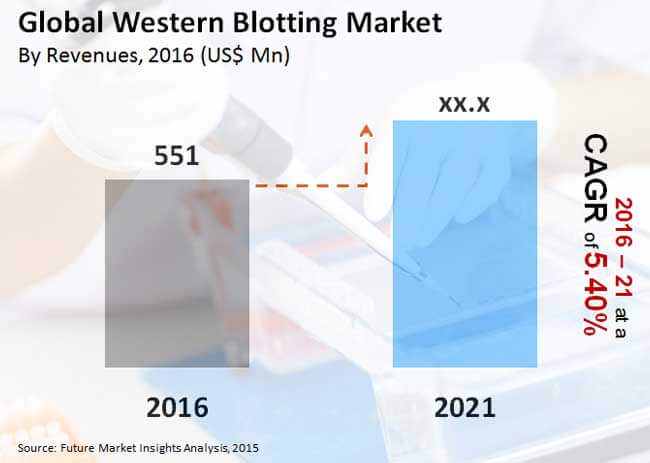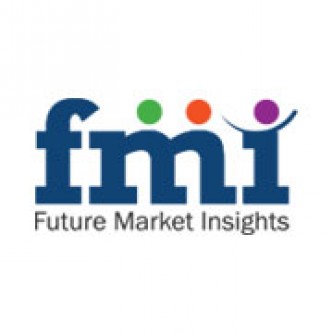Western blot, popularly termed as protein blot, is a widely used technique in proteomics. It enables researchers to study the structure and functions of the underlying proteins, precisely to identify the exact amino acid sequences in proteins. Understanding of cell signaling molecules is one of the many advantages that the western blotting technique offers. Growing investments by government and private research organisations in proteomics and other protein-related studies will remain a key factor bolstering the demand for western blotting in the near future. In terms of revenues, the molecular diagnostics field will continue to contribute a major share to the global western blotting market.
Future Market Insights examines the global western blotting market for a five-year forecast period 2016-2021. FMI indicates that the market will see steady growth over the aforementioned period. The revenues are expected to reach US$ 551.0 Mn by the end of 2016 and the market may expand at a CAGR of 5.4% during 2016-2021.
Request For Sample@ http://www.futuremarketinsights.com/reports/sample/rep-gb-1050
Flourishing Protein Research Landscape Underpins Demand for Western Blot
Protein research dynamics will remain a key factor positively influencing the market for western blotting. Growing prevalence of AIDS worldwide is expected to hold a major influence on the western blotting market growth on a global level. Amplifying investments by several leading biotechnology and pharmaceutical companies in proteomics R&D is a key factor primarily driving the market for western blotting technique.
Technological Advances and M&A Favour Market Growth
In addition, surging M&A activities among leading companies is also anticipated to flavor the market. The recent past has seen emergence of several advances in the western blotting technique, including automated western blotting and imaging. Moreover, advanced imaging software has also been introduced. These factors will continue to accelerate the market growth during the forecast period.
Personalised Medicine Trend Spurs Demand for Proteomics
With a growing trend of customised medicines, the collaborations between research institutions and pharmaceutical as well as biotechnology companies are also on the rise. This will escalate the demand for proteomics and in turn will push the market for western blotting.
However, availability of some alternative techniques to western blot may remain a long-term challenge to mass adoption of the technique. Moreover, high-efficiency procedural requirement and strict regulatory measures may also pose a restraint to the western blotting market growth.
Send An Enquiry@ http://www.futuremarketinsights.com/askus/rep-gb-1050
Electrophoresis Blotting Systems Segment Witnesses Highest CAGR
By product, the global market for western blotting is segmented into electrophoresis blotting systems, reagents kits, and transfer membranes. The reagents kits segment is expected to retain dominance over the forecast period; however FMI indicates a declining growth rate for this segment post-2016. This segment will account for nearly US$ 426.4 Mn by 2021 end, capturing over 58% share of the market. It is further segmented into chromogenic, chemiluminescent, antibodies, fluorescent, and buffer. The electrophoresis blotting systems segment is likely to exhibit substantial growth at a CAGR of 7.4%, reaching a value of around US$ 222.9 Mn by 2021 end. This segment is further classified as automated dry systems, semi-dry systems, and traditional wet transfer systems. On the basis of application, the market is fragmented into scientific research, medical diagnostics, agriculture, food and beverages, and others.
Burgeoning Proteomics Research Drive the Demand from Pharmaceutical and Biotechnology Companies
Based on end-use, the market is segmented into diagnostic laboratories, research institutions, and pharmaceutical and biotech companies. Among these, pharmaceutical and biotech companies segment will continue to lead with the maximum revenue share by 2021 end. However, research institutions segment is expected to thrive at a higher CAGR during the forecast period, followed by diagnostic laboratories segment with the least market share. These two segments are likely to observe swelling adoption of western blotting in near future.
Bio-clustres in China and India Drive the Fastest Market Growth in Asia Pacific
By geographical analysis, the global western blotting market is segmented into five key regional markets. North America is projected to continue dominance in 2016 through to 2021, primarily attributed to rising incidences of AIDS and Lyme disease, increased GMO crops production, and promising clinical research efforts. This region is also witnessing soaring research funds, in addition to an initiative for HIV vaccine development. While these factors are likely to drive the western blotting market in North America, the revenues of this region may reach US$ 253.8 Mn by 2021 end, accounting for over 35% share of the entire market value in 2021. APAC, led by China, India, and Japan, is predicted to witness the fastest growth over the forecast period, reportedly due to the presence of bio-clustres in China and India, coupled with favourable government initiatives. This region will expand at a CAGR of 6.2%, accounting for over 23% market share in 2021.

New Product Development Is the Key Strategy of Leading Players
Some of the most prominent players operating the global western blotting marketplace, include GE Healthcare, Thermo Fisher Scientific, Merck Millipore, and Bio-Rad Laboratories. Other notable companies participating in the competitive landscape are Hoffmann-La Roche Ltd., PerkinElmer Inc., LI-COR, Inc., EMD Millipore Corporation, Danaher Corporation (Lumigen, Inc.), Advansta, Inc., and Bio-Techne Corporation (ProteinSimple Inc.).
Browse Full Report@ http://www.futuremarketinsights.com/reports/western-blotting-market
Although the marketplace is intensely competitive with a large number of internationally recognised players and many small-sized companies, leading players are increasingly investing in R&D, enhanced product portfolios, and advanced marketing strategies. In order to stand out from the lot with similar product offerings, companies are focusing more on joint ventures, collaborations, operational expansion, and M&A.

